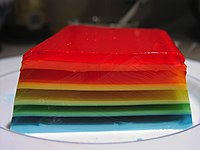
Photo from wikipedia
The effects of adding bovine skin gelatin hydrolysate obtained with subtilisin, on water-holding capacity (WHC), in a thermally processed chicken meat model, were investigated. Hydrolysates with different degrees of hydrolysis… Click to show full abstract
The effects of adding bovine skin gelatin hydrolysate obtained with subtilisin, on water-holding capacity (WHC), in a thermally processed chicken meat model, were investigated. Hydrolysates with different degrees of hydrolysis (DH) (6.57%, 13.14%, and 26.28%) were prepared. The results showed that all the tested hydrolysates improved water retention in the meat matrix. The hydrolysate with 26.28% DH showed similar behavior throughout the full range of concentrations [0% to 5% w/w] compared to that of the positive control (sodium tripolyphosphate [STPP]). In addition, the other hydrolysates [6.57% DH and 13.14% DH at 3% and 2.5% w/w concentrations, respectively] showed behaviors that coincided with that of STPP at its maximum limit allowed. A correlation was observed between the WHC and the pH of the meat samples treated with each hydrolysate or STPP. In addition, it was found that the WHC of the hydrolysates was due to increases in pH and the specific effects of the hydrolysate beyond the typical effects of pH and ionic strength in meat systems. The solubility of all hydrolysates was high (>90%). In conclusion, bovine skin gelatin hydrolysates could serve as an alternative to polyphosphates to improve water retention and the functional properties of thermally processed meat products. PRACTICAL APPLICATION: This study investigated the effects of adding bovine skin gelatin hydrolysate obtained with subtilisin on water-holding capacity (WHC) in a thermally processed chicken meat model. It was found that the hydrolysis of bovine skin gelatin with subtilisin can replace chemical products harmful to health, such as STPP, in terms of water-holding capacity. Therefore, bovine skin gelatin hydrolysate can be used as an ingredient in the formulation of thermally processed meat products.
Journal Title: Journal of food science
Year Published: 2020
Link to full text (if available)
Share on Social Media: Sign Up to like & get
recommendations!